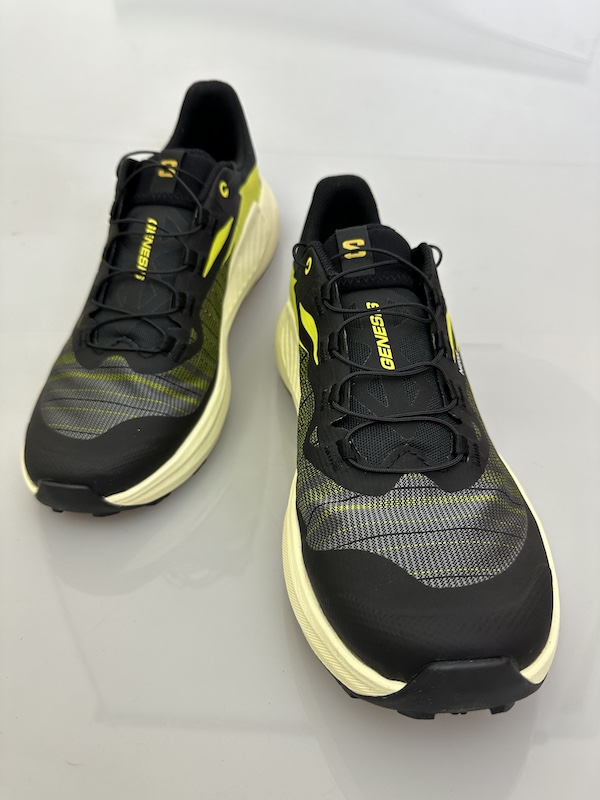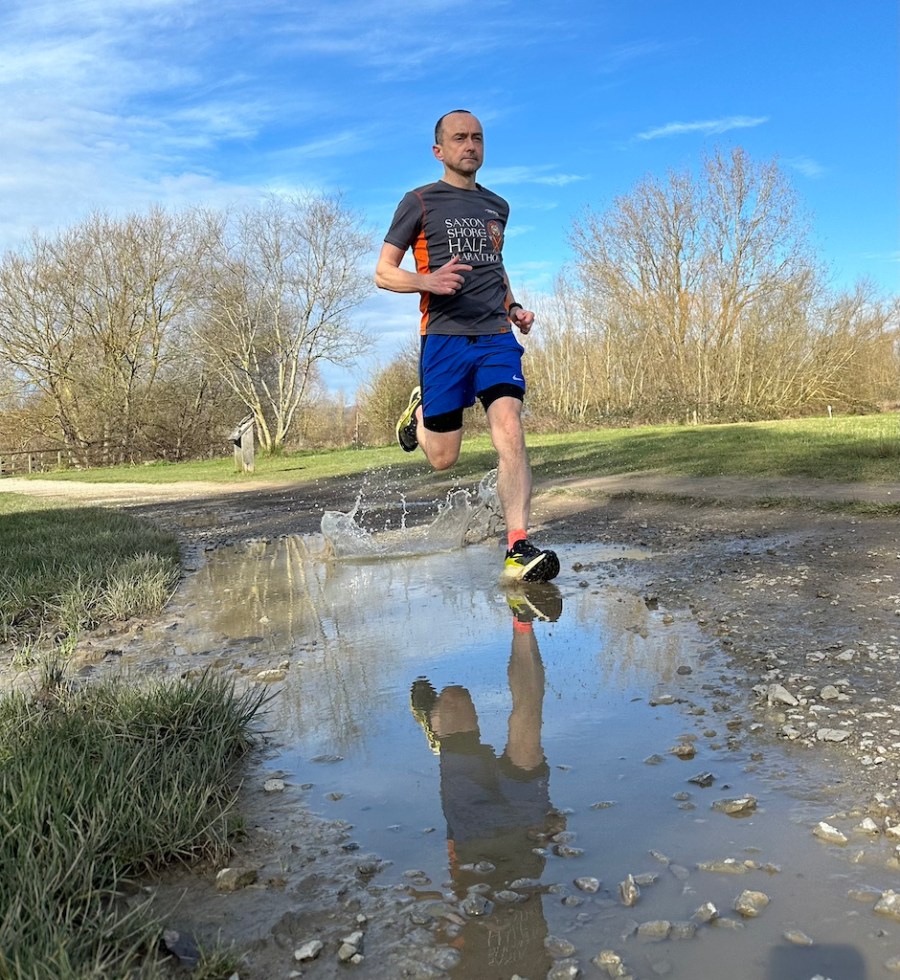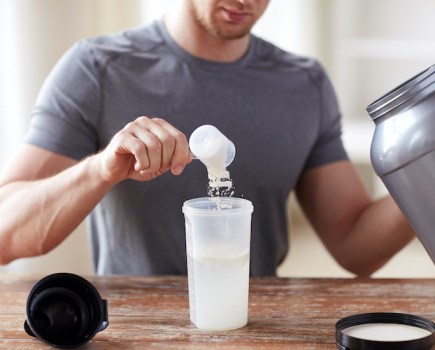Putting in some serious trail miles in the Salomon S/Lab Genesis helped me see where it really shines – on those long, easy mixed-terrain runs.
Men’s Fitness verdict
The Salomon S/Lab Genesis is a dependable all-round trail shoe. It’s solid, stable and comfortable, but not suited to the sort of extreme mud you find on some cross-country courses.- Great ground feedback and surface engagement
- Ideal for long and easy mixed-terrain trail runs
- Comfortable to wear on and off the trails
- Hard wearing and durable
- Not a PB-setting shoe due to lack of propulsion and bounce
- 4.5mm lugs struggle in really muddy conditions
- Not suited to highly technical trails
Salomon has quite a pedigree when it comes to producing fast off-road training and racing shoes. The Salomon S/Lab looks like more of an all-rounder, ideally suited to longer trails or more mixed terrain training sessions. I took to my local trails to see if it was up there with the best running shoes.
Why you can trust Men’s Fitness
We spend hours testing every product or service we review, so you can be sure you’re buying the best. Our team of reviewers includes experienced product testers, PTs and fitness writers – as well as the core MF team – who know exactly what sets the best products apart from the rest. Find out more about how we test.

Salomon S/Lab Genesis: first impressions
When I first put the Salomon S/Lab Genesis (buy now) on I found its fit was a little small. A UK 10 feels like UK 9.5, so I would say size up half a size to avoid them being too tight. However, I often take a 9.5, and these shoes were immediately comfortable for me. I wore them indoors for three hours and found them not too weighty compared to most trail shoes (they are 9.5oz / 269g).
I found the 8mm stack still offered a natural roll of the foot without affecting lateral stability and I hardly noticed the 4.5mm lugs when walking. The upper looked good; I liked the quick lace system and the generously sized toe box. Overall they looked and felt like they’d offer good breathability, grip and protection.
Salomon S/Lab Genesis performance
I was excited to test these shoes out, with some important cross-country races coming up. On my first test, I tried them out on both an easy and a slightly technical local trail including tarmac sections. The low weight and 8mm heel drop gave them a light, nimble feel, and the midsole energy foam compound felt responsive.
However, I’d say that the underfoot protection felt a little questionable on hard embedded rocks, and the grip from the 4.5mm lugs was slightly compromised in thick mud. For me, these shoes are not the best for an extreme course or rocky trail, but they did perform well going up and down hills, when either heel striking or landing on the forefoot. I had no issues at all running in these shoes on tarmac. My longest run in them was part of my marathon training, where I ran seven miles, mostly on roads, to an off-road 5K parkrun, and then ran seven miles home again. I found the Genesis perfectly comfortable for this.
Salomon S/Lab Genesis verdict
I’d say these are a good all-day pair of shoes to wear for training, on longer distances and on smoother trail surfaces. If you’re looking for a lightweight trail shoe that will help propel you forward on race day and offer further performance advantage, I’d recommend the Saucony Endorphin Edge (that’s my go-to pair), which comes with foam cushioning and a Carbitex carbon-fibre plate. Or if you’re racing on a course likely to be quite muddy look no further than the impressive inov-8 Mudtalon Speed.
A second opinion: Ian Sutherland
On taking the shoes out of the box they felt lightweight, and looked to have good amounts of protection. I found them to be very comfortable, offering a smooth, stable, well cushioned ride and I particularly liked the quick lace system, a great feature that enables a good level of locked-down fit.
On my first run the shoes gave a good level of grip and traction in most conditions, although the grip lessened when I encountered steep, muddy downhill sections of trail. This shoe definitely feels like it’s designed to excel on drier, rocky terrain.
The longest run I did in these shoes was ten miles and they proved to be comfortable from the outset. However, I’d probably not wear the shoe for any distances above a trail half marathon, as I’d prefer a little more cushioning.
On my longer runs, that poorer grip on muddy sections of trail didn’t give me the confidence I would have needed to pick up my speed. For wet autumn or winter runs I’d probably look instead to shoes like the Asics Fujispeed 2 or the inov-8 Mudtalons for really poor conditions. If you’re looking for more of a year-round trail shoe, I’d recommend the Salomon Thundercross or the Saucony Exodus 2.
How we test the best running shoes
Our testers put each shoe through their paces over a mixture of distances and paces to see where they excel, and clocked up significant distances in each one to examine how they wear over time. Each reviewer focused on speed, stability and comfort during test runs, while also assessing the effectiveness of any high-tech features on offer. Their detailed reviews are sure to help you choose the right running shoe for you.
Stephen McGlynn is an experienced osteopath, medical acupuncturist and sports massage therapist. He has worked as an NHS physiotherapist (AQP) and is a qualified England Athletics assistant coach. He has completed 12 marathons, with a PB of 2:55:25. He focuses on a mix of cross-country, trail, track and canicross events to build strength, speed and endurance, and is working his way through the A-Z of UK & international marathons.
Ian Sutherland is the owner of Trail Adventures UK. He started running in 2016 and is an experienced marathon and ultra-marathon runner. He’s run more than 15 road marathons, including all six of the Abbott World Marathon Majors, and 14 off-road ultra marathons. He holds a UK Athletics Coach in Running Fitness license as well as UK Athletics Leader in Running Fitness.
Related content:







